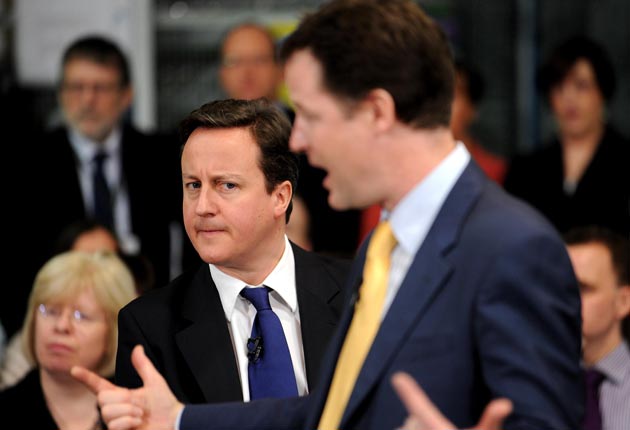Andrew Grice: Nick Clegg has a plan to profit from defeat on AV
Inside Westminster

All the political parties will put their usual gloss on the results in the Scottish Parliament, Welsh Assembly and English council elections on 5 May. But there can only be one winner in the referendum on the same day on whether to replace the current first-past-the-post system for electing MPs with the alternative vote (AV).
Normally, disputes between the Conservative and Liberal Democrat Coalition partners are resolved in a friendly, business-like manner, often by David Cameron and Nick Clegg themselves. The deals are mostly done behind closed doors. The referendum will be different and very public. A civil servant who works with both men likens them to "two boxers getting in the ring, knowing only one can come out on top".
Over the next five weeks, it may look as if the special relationship between Dave and Nick has hit a rough patch. Yet appearances can be deceptive. Some allies argue the two men can agree to disagree because their fundamental relationship is so strong; the cement that has held the Coalition together so far will ensure it continues whatever the referendum result.
To reassure their own troops, the two leaders agreed to make very different speeches on multiculturalism. There'll be a second controlled explosion on Europe, I hear.
The Prime Minister and his deputy have agreed to avoid personal attacks on each other during the referendum campaign and that there will be no triumphalism. They know that the winner will have to compensate the loser, even though they haven't yet worked out what the package might include.
Until recent weeks, there was a rather lazy assumption in Tory circles that Mr Clegg was bound to be the loser. Then there was a bit of a wobble in Toryland as it realised it could not take victory for granted.
There is talk in the Commons tea rooms of Tory MPs declaring "civil war" if the public vote Yes to AV. True, this comes from Tory diehards who never liked the Coalition in the first place and complain that the Liberal Democrats exercise far more influence over government policies than their 57 MPs warrant.
Other Tories warn of "guerrilla warfare", a more realistic scenario, in which Tory MPs would be much more likely to rebel if Mr Cameron loses the referendum – especially those who fear they would lose their seats under AV. The Prime Minister knows there would be trouble ahead.
Although the Liberal Democrats have punched above their weight in spats over government policy, a No vote would provoke claims that Mr Clegg had blown a once-in-a-generation opportunity to change the voting system and revive the "What did the Romans ever do for us?" question about the Coalition.
Until recently, Mr Clegg's fall-back plan was to demand the speeding up of plans to create a mainly elected House of Lords. While that might raise a cheer at a Lib Dem conference, it hardly sets pulses racing in the Dog and Duck. And it would take years.
So Mr Clegg has set his sights on a much bigger prize: a U-turn in the controversial NHS reforms to hand 80 per cent of the budget to GPs and scrap primary care trusts (PCTs). Mr Clegg is convinced that there must be big symbolic changes to the NHS and Social Care Bill. By one of those happy coincidences, a final decisions on whether the Government will make a technical tweak or something the media would call a U-turn are unlikely to be taken until after 5 May. So Mr Clegg's hand would be strengthened by a No vote. That would not be good news for Andrew Lansley, the Health Secretary, who does not want to fillet reforms he has been cooking up for eight years in opposition and government (even though the Tories didn't exactly shout about them from the rooftops during last year's election). He knows that Mr Cameron will demand some changes and is prepared to see a few technical amendments to the Bill during its passage through Parliament. It could face a rough ride in the House of Lords, so tweaking will probably be needed anyway. Mr Clegg's worry is that the public would not notice fine-tuning. He fears that such a big shake-up, at a time when the NHS will be under intense pressure to make efficiency savings, would result in the Government being blamed for all the ills caused by the cash squeeze. For Mr Cameron, such a scenario would be highly dangerous. Reassuring the public about the Tories' intentions on health was a big part of his project to decontaminate his party. But allowing Mr Clegg to get the credit for a U-turn on the NHS plans would carry big risks. The Liberal-Conservative Government was supposed to complete the detoxification process, not put it into reverse. "We can't let the Lib Dems be the Coalition's conscience," one Cameron ally said yesterday.
Some insiders believe the decision on the NHS reforms could be the biggest test yet for the Cameron-Clegg relationship. The stakes are high: get it wrong, senior Lib Dems believe, and health could be dominant in a 2015 election. No prizes for guessing who would love that – Labour.
Join our commenting forum
Join thought-provoking conversations, follow other Independent readers and see their replies
Comments
Bookmark popover
Removed from bookmarks